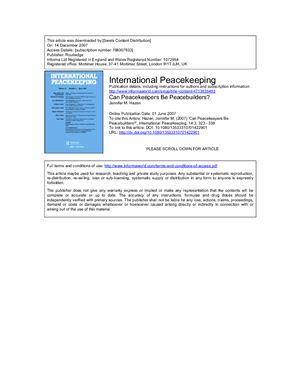The role of UN peacekeeping missions has expanded beyond the
traditional tasks of peacekeeping
to include a wide range of political, economic, and humanitarian activities. While
such expansion indicates an improved understanding of the complexities and challenges of
post-conflict contexts, it also raises questions about whether UN peacekeeping missions are
equipped to handle peacebuilding tasks. Evidence from a study of the peacekeeping mission
in Sierra Leone suggests they are not. This article argues that peacekeeping missions are a
poor choice for peacebuilding given their limited mandates, capacity, leverage, resources
and duration. Peacekeepers should focus on peacekeeping, by which they can lay the foundation
for peacebuilding. Peacebuilding should be the primary task of national govements
and their populations.
to include a wide range of political, economic, and humanitarian activities. While
such expansion indicates an improved understanding of the complexities and challenges of
post-conflict contexts, it also raises questions about whether UN peacekeeping missions are
equipped to handle peacebuilding tasks. Evidence from a study of the peacekeeping mission
in Sierra Leone suggests they are not. This article argues that peacekeeping missions are a
poor choice for peacebuilding given their limited mandates, capacity, leverage, resources
and duration. Peacekeepers should focus on peacekeeping, by which they can lay the foundation
for peacebuilding. Peacebuilding should be the primary task of national govements
and their populations.

